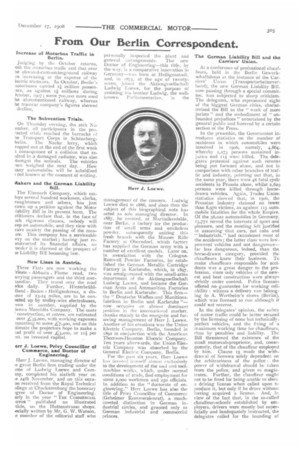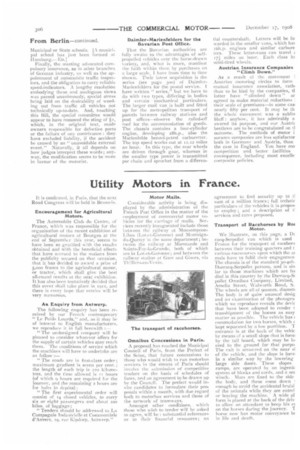From Our Berlin Correspondent.
Page 15

Page 16

If you've noticed an error in this article please click here to report it so we can fix it.
Increase of Motorbus Traffic in Berlin.
Judging by the October returns, oth the motorbus traffic and that over he elevated-cum-underg-round railway .re increasing at the expense of the lectric tramcars. In October, Berlin's notorbuses carried 24,million passen;ers, as against zk millions during ktober, t907; some 700,000 more used he aforementioned railway, whereas he tramcar company's figures showed
• decline.
The Subvention Trials.
On Thursday evening, the 26th Noember, all participants in the proracted trials reached the barracks of he Transport Corps in Schoneberglerlin. The Nacke lorry, which ropped out at the end of the first week 1 consequence of a collision that reulted in a damaged radiator, was also
mongst the arrivals. The vehicles 'ere weighed the next day.. How "any automobiles will be subsidised ; not known at the moment of writing.
61Lakers and the German Liability Bill.
The Eisenach Company, which emlays several hundred workmen, clerks, raughtsmen and others, has just rawn up a petition against the Motor ,iability Bill in its present form. The etitioners declare that, in the face of ich rigorous clauses, nobody will eep an automobile, and they view with rave anxiety the passing of the meaire. This company has a serviceable wry on the market ; having just resnstructed its financial affairs, no ssnder it is alarmed at the prospect of le Liability Bill becoming law.
New Lines in Austria.
Three Fiat, are now working the 'rieste Abbazia Fiume road, two irrying passengers and the third mersandise. They travel over the road vice daily. Further, Hi nterbrii hlBand Baden Heiligenkreuz, a dis
ince of 23-24 miles, are to he con
ected up by trolley-wire electrobuses, :yen in number, supplied by the ienna Mercedes Company. The costs construction, et cetera, are estimated : over ,-35,000, with working expenses nounting to some ..7,400, and on this ;timate the projectors hope to make a ad profit of over .3,000, or ILI per :nt, on invested capital.
err J. Loewe, Privy Councillor of Commerce, and Doctor of Engineering.
Herr J. Loewe, managing director of le great Berlin firm trading under the Arne of Ludwig Loewe and Corn. my, completed his sixtieth year on te 24th November, and on this occaon received from the Royal Technical ollege at Charlottenburg the honorary tgree of Doctor of Engineering. any in the year "THE COMMERCIAL :OTOR " published an illustrated tide, on the Huttenstrasse shops, ecially written by Mr. G. W. Watson, e member of the editorial staff who
personally inspected the plant and general arrangements. The new Doctor of Engineering—this tide, by the way, is a comparative innovation in Germany—was born at Heiligenstadt, and, in 18,75, at the age of twentyseven, joined the Aktiengesellschaft Ludwig Loewe, for the purpose of assisting his brother Ludwig, the wellknown Parliamentarian, in the
management of the concern. Ludwig Loewe died in 1886, and since then the subject of this biographical note has acted as sole managing director. In 1887, he created, at Martinikenfelde, near Berlin, a factory for the production of small arms and smokeless powder, subsequently uniting this fresh branch with the Mauser Rifle Factory at Oberndorf, which factory has supplied the German army with a number of excellent models. Later on, in association with the CologneRottweil Powder Factories, he established the German Metallic Cartridge Factory in Karlsruhe, which, in 1897, was amalgamated with the small-arms department of the Aktiengesellschaft Ludwig Loewe, and became the German Arms and Ammunition Factories in Berlin and Karlsruhe. This firm— the" Deutsche Waffen-und Munitionsfabriken in Berlin und Karlsruhe "now occupies an almost dominant position in rue international market. thanks mainly to the energetic and farseeing management of Herr J. Loewe. Another of his creations was the Union Electric Company, Berlin, founded in 1892 in conjunction with the American Thomson-Houston Electric Company. Ten years afterwards, the Union Electric Company was absorbed by the General Electric Company, Berlin.
For the past six years, Herr Loewe has devoted himself almost exclusively to the development of the tool and toolmachine works, which, under normal conditions of trade, find employment for some 2,000 workmen and 250 officials. In addition to the "doctorate of engineering," Herr Loewe has also the title of Privy Councillor of Commerce (Geheimer Kommerzienrat), a muchcoveted distinction in German industrial circles, and granted only to German industrial and commercial princes. The German Liability Bill and the Carriers' Union.
At a conference of professional chauffeurs, held in the Berlin Gewerkschaftshaus at the instance of the Carriers' Union (Transportarbei terverband), the new German Liability Bill, now passing through a special committee, was subjected to sharp criticism. The delegates, who represented eight of the biggest German cities, characterised the Bill as the " work of mere jurists" and the embodiment of " unfounded prejudices" entertained by the general public and fostered by a certain section of the Press.
In the preamble, the Government introduces statistics on the number of accidents in which automobiles were involved in 1906, namely, 4,864, whereby 1,173 persons sustained injuries and 115 were killed. The delegates protested against such returns being put forward alone, and not in comparison with other branches of traffic and industry, pointing out that, in the same year, there were 48 fatal cycle accidents in Prussia alone, whilst 2,629 persons were killed through horsedrawn vehicles. Again, Trades Union statistics showed that, in 1906, the Prussian industry claimed no fewer than 8,970 victims, as against ifs automobile fatalities for the whole Empire. Of the 36,022 automobiles in Germany, 13,771 served the interests of sport and pleasure, and the meeting felt justified in assuming that cars, not cabs and " industrials," had occasioned most of the accidents; the latter class were lowpowered vehicles and not dangerous— far less dangerous, indeed, than the horse-drawn category, provided the chauffeurs knew their business. To make chauffeurs responsible for accidents was a great danger to the profession, since only vehicles of the newest and best construction were always strictly under control. Police licenses offered no guarantee for working reliability: witness a delivery van belonging to A. Wertheim's stores (Berlin), which was licensed to run although it could not reverse.
In the delegates' opinion, the safety of motor traffic could be better secured by the licensing of none but technicallyperfect vehicles, and the fixing of a maximum working time for chauffeurs, than by penalties and liability. The Bill threatened the existence of the small motorcab-proprietor, and, consequently, that of the chauffeur employed by him. Clause t5 made the withdrawal of licenses solely dependent on the arbitrariness of the police : the power of withdrawal should be taken from the police, and given to magistrates. Further, the chauffeur ought not to be fined for being unable to shoe a driving license when called upon to produce it, but only if he drove without having acquired a license. And, in view of the fact that, in the so-called chauffeur-schools established by employers, drivers were mostly but superficially and inadequately instructed, the delegates called for the founding of
Municipal or State schools. [A municipal school has just been formed at Iamburg.—ED.) Finally, the meeting advocated compulsory insurance, as in other branches of German industry, as well as the appointment of automobile traffic inspectors, and the obligation to carry reliable speed-indicators, A lengthy resolution embodying these and analogous views was passed unanimously, special stress being laid on the desirability of weeding out from traffic all vehicles not technically up-to-date. And, touching this Bill, the special committee would appear to have removed the sting of §I, which, in the original text, made owners responsible for defective parts or the failure of any contrivance : they have excluded liability, if the accident be caused by an " unavoidable external event." Naturally, it all depends on how judges interpret these words ; anyway, the modification seems to be more in favour of the motorist. Daimler-Marienfelders for the Bavarian Post Office.
That the Bavarian authorities are fully awake to the advantages of selfpropelled vehicles over the horse-drawn variety, and, what is more, manifest the faith within them by purchases on a large scale, I have from time to time shown. Their latest acquisition is the series (see page 300) of DaimlerMarienfelders for the postal service. I have written " series," but we have to do with two types, differing in bodies and certain mechanical particulars. The larger mail van is built and fitted up for the metropolitan transport of parcels between railway stations and post offices—observe the railed-off roof for the accommodation of goods. The chassis contains a four-cylinder engine, developing 28h.p., also the Nlarienfelde benzol-petrol carburetter. The top speed works out at ILL2 miles an hour. In this type, the rear wheels are driven through gear, whereas in the smaller type power is transmitted per chain and sprocket from a differen
tial countershaft. Letters will be fo: warded in the smaller vans, which has 16h.p. engines and similar carbure tars. These letter-vans can travel :t 17?,miles an hour. Each class les solid-tired wheels.
Austrian Insurance Companies "Climb Down."
As a result of the movement Austrian motoring circles to form mutual insurance association, rath4 than to be bled by the companies, ti latter have "climbed down" ar agreed to make material reductions their scale of premiums—in some cast nearly fifty per cent. It may be th• the whole movement was a sublin bluff : anyhow, it has admirably a steered its purpose, and our Austth brethren are to be congratulated on tl outcome. The methods of motor i surance companies are less satisfactor both in Germany and Austria, than the case in England. You have mo competition and better facilities consequence, including most excelle composite policies.






















